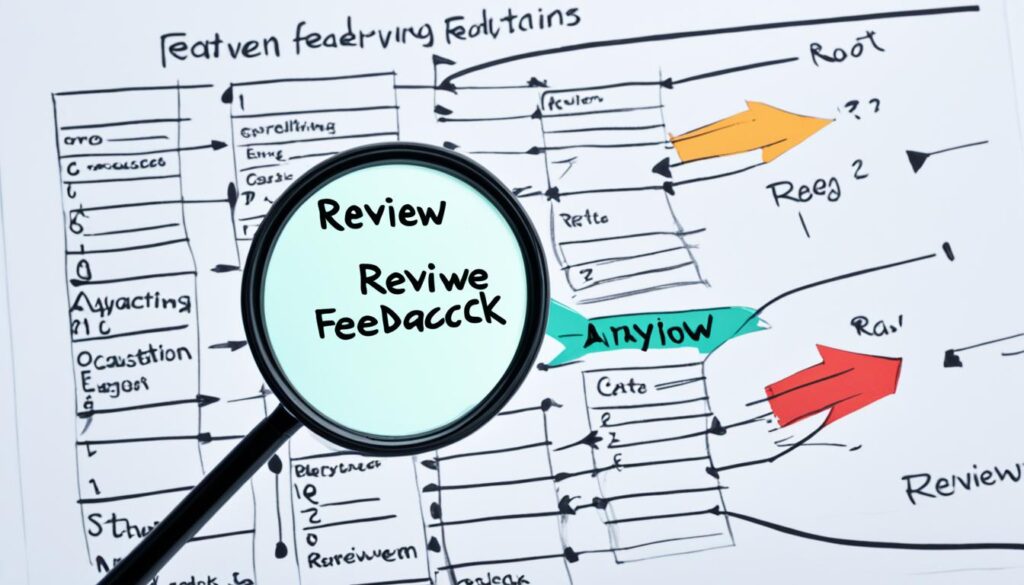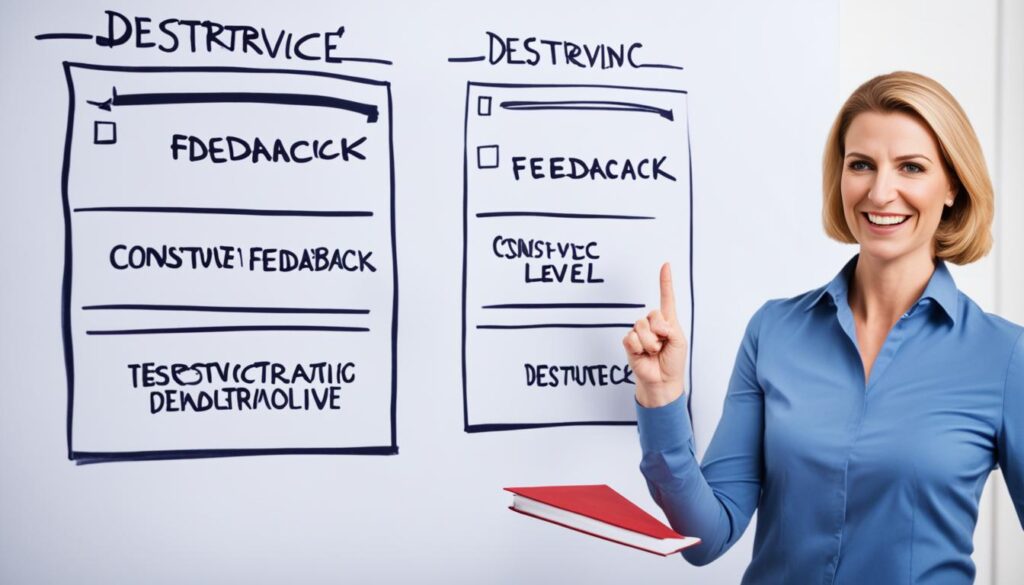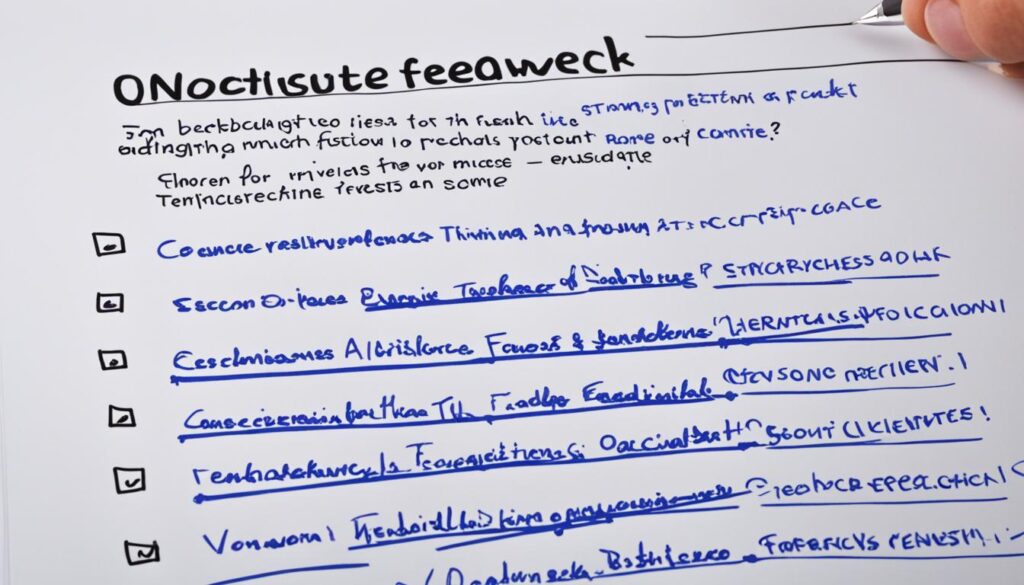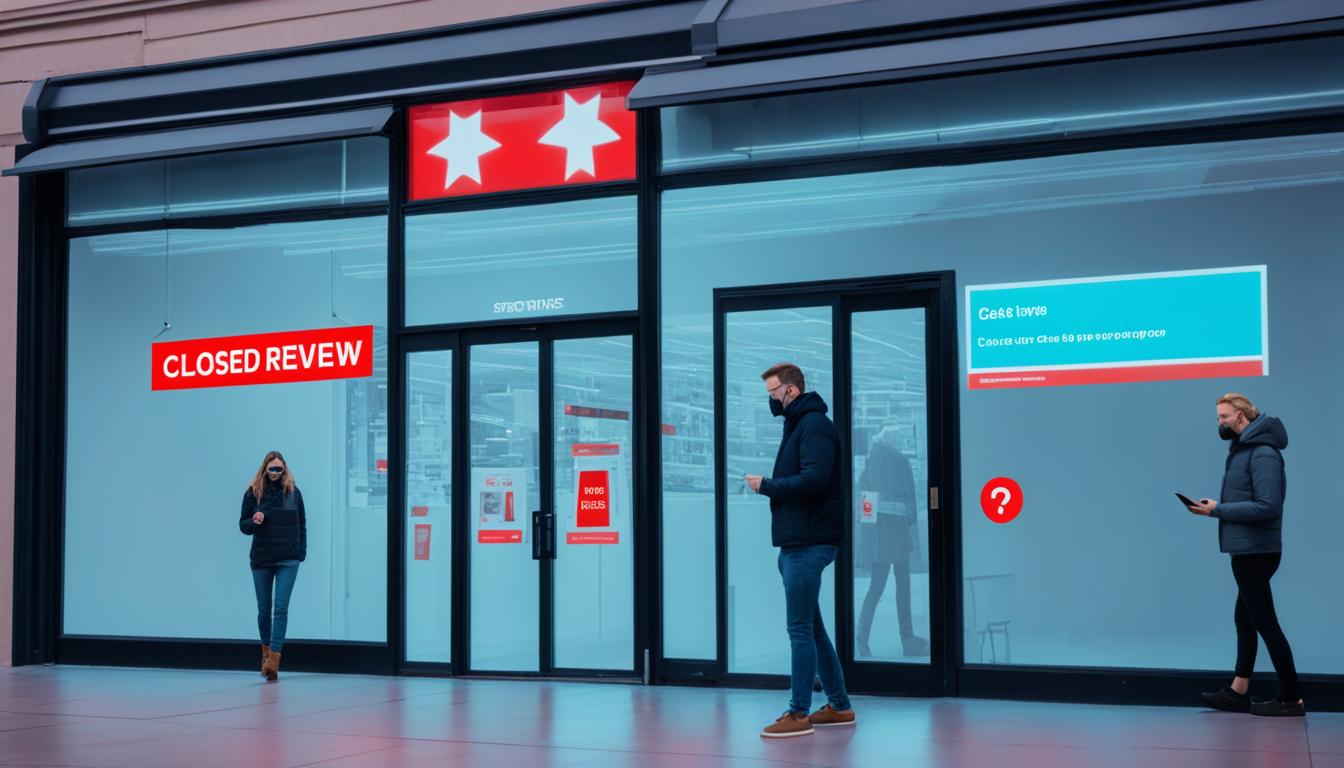Ever thought how a single bad review could affect your business? In today’s world, managing your online reputation is key. A huge 76% of people trust online reviews as much as personal advice, and nine out of ten check reviews before buying1. This guide will teach you how to turn those bad reviews into chances for growth and making customers happy.
We’ll look at great ways to handle customer feedback, keep your online reputation strong, and turn negative experiences into positives. By the end, you’ll know how to not just fix bad reviews but also use them to make your business better and keep customers coming back.
A single bad experience can take up to 12 good ones to fix2. That’s why it’s so important to quickly and professionally handle negative reviews. Let’s get started and learn how to turn those bad reviews into something good in the world of customer feedback.
Key Takeaways
- Most consumers trust and read online reviews before purchasing
- Prompt response to negative reviews is crucial for reputation management
- Negative feedback can provide valuable insights for business improvement
- Turning negative reviews into opportunities can enhance customer loyalty
- Effective review management can positively impact your brand image
Understanding the Impact of Negative Reviews
Negative reviews can greatly affect a business’s online image and buying choices. Today, 99.75% of online shoppers read reviews, with 91% doing so often3. This shows how important review sites are in forming what people think and trust.
Negative reviews do more than just lose sales. They can harm a company’s reputation and keep away potential customers. But, having both good and bad reviews can make a brand more trustworthy. In fact, 56% of what consumers think of a brand comes from how the company answers online reviews4.
Businesses must keep an eye on review sites. Quick replies to negative feedback are key. Over 88% of consumers are more likely to use a business if they see the owner answers all reviews, both good and bad3. This shows a business cares about customer satisfaction and might turn critics into fans.
“Negative reviews are opportunities for growth. They help brands appear authentic and show customers we value their feedback.”
Customers are more likely to leave negative reviews after a bad experience than positive ones after a good one3. This highlights the need for businesses to quickly and professionally address negative feedback. By doing so, companies show they care about customer service and might change a negative situation into a positive one.
In conclusion, negative reviews can hurt customer trust and buying choices. But, they also offer chances for businesses to boost their online reputation with careful engagement and a focus on customers.
Identifying the Root Causes of Negative Reviews
Negative reviews often come from a gap between what customers expect and what they get. We must look closely at what customers are unhappy about. By analyzing reviews, we can find patterns and see where we can improve.
Online reviews are key in helping people decide what to buy. Most people read reviews before buying something, and many trust them as much as advice from friends5. This shows how important it is to quickly and well handle negative feedback.

Product problems are a big reason for negative reviews. By looking at what customers say, we can spot common issues and fix them. It’s important to know that up to 40% of Amazon reviews might not be real, so we must be careful when checking feedback6.
What customers expect also matters a lot. If what they get doesn’t match their expectations, they’ll likely leave negative reviews. Interestingly, 30% of people think reviews are fake if they’re all positive, showing that a mix of good and bad reviews can make things more believable6.
| Root Cause | Impact | Action |
|---|---|---|
| Product Quality Issues | Immediate Negative Reviews | Quality Control Improvement |
| Poor Customer Service | Long-term Reputation Damage | Staff Training and Development |
| Unmet Expectations | Customer Dissatisfaction | Clear Communication of Product/Service Features |
By fixing these issues, we can turn negative reviews into chances to grow. Remember, 40% of unhappy customers who leave a review might come back with the right attention and care6. This not only makes customers happier but also makes our brand stronger over time.
Differentiating Between Constructive and Destructive Feedback
In review management, it’s key to know the difference between constructive and destructive feedback. Constructive criticism gives valuable insights and chances to get better. It’s given with respect, aiming to help improve with new ideas or solutions7.
Destructive feedback is harsh or belittling, focusing on mistakes without offering ways to fix them7. It often comes from anger, insecurity, or jealousy, showing the giver’s feelings rather than helpful advice8.

It’s important to tell constructive from destructive feedback. Constructive criticism boosts motivation and inspires growth9. It’s clear, actionable, and targets specific behaviors to improve9.
When you get destructive feedback, don’t let it affect your self-worth. Seeing all feedback as a chance to get better can help78.
| Constructive Criticism | Destructive Feedback |
|---|---|
| Respectful delivery | Aggressive or condescending tone |
| Offers solutions | Focuses on errors without solutions |
| Aims to improve performance | Can erode confidence |
| Specific and actionable | Generalizes and attacks character |
Knowing how to spot constructive from destructive feedback helps businesses improve their review management. It turns negative reviews into chances for growth and better customer satisfaction.
Developing a Systematic Approach to Review Management
Having a strong review management strategy is key to keeping a good online image. With 98% of people reading online reviews for local businesses, it’s important to manage feedback well10.
Set aside time each week to look at both good and bad reviews. Doing this helps you answer quickly, which builds trust with customers and helps your search engine rankings1112.

Use response templates to make replying easier. This keeps your messages consistent but lets you adjust for different customer issues.
“Responding to reviews online can improve positioning on search results pages.”
Use feedback monitoring tools to keep track of reviews on sites like Google, Facebook, TripAdvisor, and Yelp10. Get alerts for new feedback and answer quickly.
| Review Platform | Key Feature | Impact on Business |
|---|---|---|
| Google My Business | Knowledge Panel display | Increased search visibility |
| Facebook Pages | Recommendations and ratings | Social proof for potential customers |
| TripAdvisor | Travel-focused reviews | Crucial for hospitality businesses |
If you get a lot of reviews, think about hiring extra staff or working with a reputation management company. This can be a smart move, as 89% of shoppers check customer ratings before buying11.
Turning Negative Reviews into Opportunities
Negative reviews can be a chance for businesses to improve customer satisfaction and loyalty. By responding quickly and with empathy, we can turn unhappy customers into strong supporters. This method also helps us manage our reputation better and show our dedication to solving problems.
When dealing with negative feedback, it’s important to ask for more details and offer clear solutions. For example, quickly replacing faulty products can change a bad experience into a good one13. Since 86% of customers are hesitant to buy from companies with bad reviews, every reply is a chance to gain back trust14.
To make the most of our review responses:
- Respond within 24-48 hours
- Personalize each response
- Encourage offline communication for detailed resolution
- Avoid making promises we can’t keep
By dealing with negative reviews in a positive way, we can make reviews more helpful and draw in more potential customers15. This active approach not only solves current issues but also shows our ongoing commitment to making things better and keeping customers happy.
“Every complaint is a gift. It’s an opportunity to learn and grow.”
Our main aim is to turn unhappy customers into loyal ones. By offering thoughtful solutions to negative reviews, we can improve our online image and maybe even boost sales15. This strategy is crucial for managing our digital reputation and achieving long-term business success.
Implementing Changes Based on Feedback
Turning negative reviews into positive outcomes requires action. We’ve found that making changes based on customer feedback is key for getting better. By listening to our customers, we can make our products and services better.
Studies show that 99% of customers read reviews before buying online, showing how important it is to quickly address negative feedback16. Let’s see how we can use this to make positive changes.

To start improving, we look at patterns in customer feedback. This helps us know what to focus on. Then, we make a plan for improving our products and processes based on what we learn.
Here’s a breakdown of how we implement feedback:
| Step | Action | Outcome |
|---|---|---|
| 1. Collect Feedback | Gather reviews from various platforms | Comprehensive view of customer opinions |
| 2. Analyze Trends | Identify recurring issues or suggestions | Clear focus areas for improvement |
| 3. Develop Solutions | Brainstorm and plan changes | Targeted improvements in products/services |
| 4. Implement Changes | Execute planned improvements | Enhanced customer experience |
| 5. Communicate Updates | Inform customers about changes | Improved brand perception |
By doing this, we’ve seen a big jump in customer happiness. Remember, 51.7% of consumers want businesses to answer negative reviews quickly16. This shows how important it is to act fast on feedback.
Our way of working encourages us to always get better. We keep updating our rules and training to fix common problems from reviews. This forward-thinking helps us meet customer needs and bring positive changes to our company.
Leveraging Negative Reviews for Positive Brand Image
Negative reviews can be powerful tools for building brand transparency and customer trust. A staggering 96% of consumers actively seek out negative reviews, with over half specifically looking for one-star ratings17. This trend shows how important it is to use all feedback in review marketing strategies.
Responding to negative reviews publicly shows accountability and a commitment to solving problems. By doing so, businesses can turn unhappy customers into brand supporters. In fact, more than a quarter of people aged 30 and older have changed a negative review to a positive one after their feedback was addressed17.
Using both positive and negative reviews in marketing builds credibility. This matches what consumers do, as 85% of shoppers look for negative reviews when researching products18. By being open, businesses can improve their online reputation and build trust.
“Negative reviews help shoppers determine if a product fits their needs, reducing potential returns and enhancing informed purchase decisions.”
Analyzing negative feedback gives valuable insights for improving products. For example, one company found issues with a children’s play kitchen through negative reviews. They made quality improvements and saw higher star ratings18. This approach not only betters products but also shows a dedication to making customers happy.
| Impact of Reviews | Percentage |
|---|---|
| Consumers trusting online reviews as much as personal recommendations | 88% |
| Shoppers deterred by negative reviews | 82% |
| Increase in revenue with a one-star increase on Yelp | Up to 9% |
By using negative reviews well, businesses can improve their brand image, increase customer trust, and boost sales. Remember, 93% of shoppers check reviews before buying, making review management key for social proof and online reputation19.
Conclusion
Managing negative reviews is key to a strong online reputation today. We’ve seen that 94% of people avoid businesses with bad reviews20. It shows how vital it is to quickly and well handle customer feedback.
Having a good plan for responding to reviews can change negative experiences into positive ones. It’s important to answer to negative comments fast, within two hours, to show you care21. This quick action helps protect your brand and might make customers more likely to visit you. In fact, 45% of people might choose to go to a place that responds to bad reviews20.
To make your business better and keep customers happy, focus on the quality of service you offer. About 50-75% of good reviews come from great service22. Use social media tools to make managing reviews easier, which helps with customer trust and engagement21. By talking to customers and solving their problems, we can turn negative feedback into chances for growth and a better online image.
FAQ
Why are negative reviews important for businesses?
How can businesses identify the root causes of negative reviews?
What is the difference between constructive and destructive feedback?
How can businesses develop a systematic approach to review management?
How can negative reviews be turned into opportunities?
How can businesses implement changes based on customer feedback?
How can negative reviews be leveraged for a positive brand image?
Source Links
- 6 Solid Ways to Turn Negative Reviews into Positive Reviews – Reputation – https://reputation.com/resources/articles/6-solid-ways-to-turn-negative-reviews-into-positive-reviews/
- Turn negative customer reviews into positive with these 7 steps – https://birdeye.com/blog/negative-customer-reviews/
- Turn Customer Reviews Into Gold – https://www.cmswire.com/customer-experience/how-customer-reviews-can-make-or-break-your-business/
- Council Post: Why Negative Reviews Can Help Your Business Improve – https://www.forbes.com/sites/forbesbusinesscouncil/2022/09/06/why-negative-reviews-can-help-your-business-improve/
- 6 Solid Ways to Turn Negative Reviews into Positive Reviews – Reputation – https://reputation.com/resources/articles/6-solid-ways-to-turn-negative-reviews-into-positive-reviews
- 7 Reasons Why Negative Reviews Are Valuable – https://www.widewail.com/blog/2018/10/16/why-negative-reviews-are-valuable-to-your-business
- Constructive Vs. Destructive Criticism At Work – https://officedynamics.com/constructive-vs-destructive-criticism-at-work/
- Destructive Vs. Constructive Criticism: Learn to Tell the Difference | Thriveworks – https://thriveworks.com/blog/destructive-vs-constructive-criticism/
- Criticism Vs. Feedback: What’s More Effective | Reverb – https://reverbpeople.com/blog/feedback-vs-criticism-softening-the-blow/
- Creating an online review management strategy – https://sproutsocial.com/insights/online-review-management/
- How to respond to negative reviews: Examples and best practices – https://www.bazaarvoice.com/blog/how-to-respond-to-negative-reviews-examples-and-best-practices/
- How to Respond to Negative Reviews (With Examples and Templates) – https://getjobber.com/academy/negative-review-response-examples/
- How to Turn Negative Reviews Into Business Opportunities in 2023 – https://rizereviews.com/how-to-turn-negative-reviews-into-business-opportunities-in-2023/
- Turning Negative Reviews into Positive Opportunities – FasterCapital – https://fastercapital.com/content/Turning-Negative-Reviews-into-Positive-Opportunities.html
- How can you turn negative reviews into opportunities for improvement and customer loyalty? – https://www.linkedin.com/advice/0/how-can-you-turn-negative-reviews-opportunities
- Tactics to Turn Negative Reviews into Positive Reviews – https://www.surveysensum.com/blog/turn-negative-reviews-into-positive-reviews
- Negative Customer Review? Turn It Into a Positive Opportunity – https://www.linkedin.com/pulse/negative-customer-review-turn-positive-opportunity-evolveclub
- Why Negative Reviews are Good for Your Business (and 3 Ways to Leverage Them) – PowerReviews – https://www.powerreviews.com/3-ways-to-leverage-negative-reviews/
- Council Post: How To Leverage Your Brand’s Reviews – https://www.forbes.com/sites/forbescommunicationscouncil/2024/02/12/how-to-leverage-your-brands-reviews/
- Powerful Examples of How to Respond to Negative Reviews – https://www.reviewtrackers.com/guides/examples-responding-reviews/
- How Brands Handle Negative Comments on Social Media – https://www.socialpilot.co/blog/negative-comments-social-media
- 031 – Turning Customer Feedback into E-commerce Success – https://www.busterfetcher.com/womenpoweringecommerce/031-turning-customer-feedback-into-ecommerce-success

